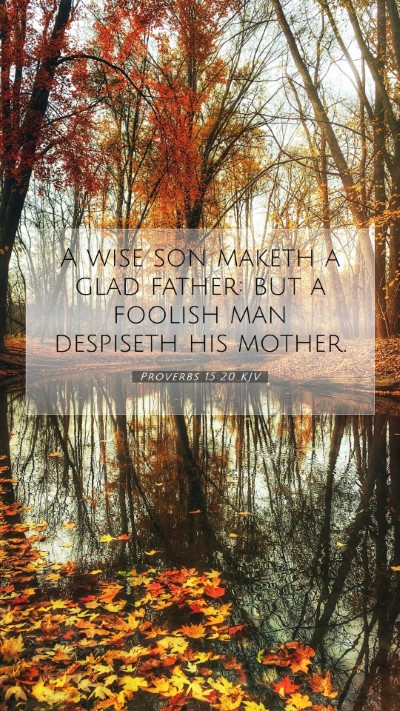Understanding Proverbs 15:20
Proverbs 15:20 states: "A wise son makes a glad father; but a foolish man despises his mother."
This verse encapsulates profound insights into the dynamics of family relationships, the value of wisdom, and the consequences of folly.
Bible Verse Commentary
In this scripture, the contrast between a wise son and a foolish man is emphasized. Matthew Henry outlines that wisdom is characterized by behaviors that please and uplift parents, while foolishness leads to contempt and disrespect for maternal guidance.
Albert Barnes elaborates that a wise son brings joy to his father through his actions and choices, reflecting positively on his upbringing. This joy arises from a sense of fulfillment that a parent derives from seeing their child act in accordance with knowledge and virtue.
Adam Clarke notes that the term "foolish man" indicates not merely ignorance but a willful rejection of wisdom, often leading to strained family relations. This disrespect holds broader implications beyond the household, affecting one's standing in society.
Key Themes and Meanings
- Wise Decisions: The verse highlights the importance of making wise decisions that bring joy to one’s parents and foster healthy family relationships.
- Family Dynamics: It underscores the structural role of parents and children, emphasizing the joy that stems from wisdom and the pain that results from foolishness.
- Respect and Honor: The contrast between a wise son and a foolish man speaks silently but powerfully about the necessity of honoring one’s parents.
Biblical Exegesis
The interpretation of this verse becomes rich when considering its placement within the Book of Proverbs, a collection known for its practical wisdom and ethical teachings.
Engaging in a Bible study group or online Bible study can enhance understanding of these principles, as the lessons from Proverbs often have direct applications to daily life.
Application in Daily Life
Understanding Proverbs 15:20 encourages individuals to reflect on their own relationships with their parents. Are your actions bringing joy or sorrow? This self-reflection can guide one in altering behavior towards fostering a more positive family atmosphere.
As members of society, being "wise" often translates to how we treat not only our parents but also other authority figures, recognizing the extended principle of respect and its rewards.
Related Bible Cross References
- Proverbs 10:1 - "The proverbs of Solomon: A wise son brings joy to his father, but a foolish son brings grief to his mother."
- Ephesians 6:1-3 - "Children, obey your parents in the Lord, for this is right. Honor your father and mother..."
- Colossians 3:20 - "Children, obey your parents in everything, for this pleases the Lord."
In-Depth Bible Verse Analysis
Engaging in biblical exegesis of Proverbs 15:20 provides clarity on the broader implications of wisdom and foolishness within familial structures. The phrase "makes a glad father" indicates an intrinsic joy that reverberates through familial ties when a child embodies wisdom.
The "foolish man" mentioned here represents a broader attitude that can manifest in rejection of not only parental guidance but also of societal norms and values. Understanding these contrasting characters is vital when applying the lessons of Scripture.
Conclusion
Proverbs 15:20 delivers a poignant reminder of the weight that our choices carry, especially in familial relationships. It encourages individuals to aspire to wisdom in their actions, aiming to cultivate joy within their households.
Through insights gained from bible study resources and commentaries, one can appreciate the intricate layers of meaning behind such verses, leading to a richer understanding of Scripture and practical applications in life.


